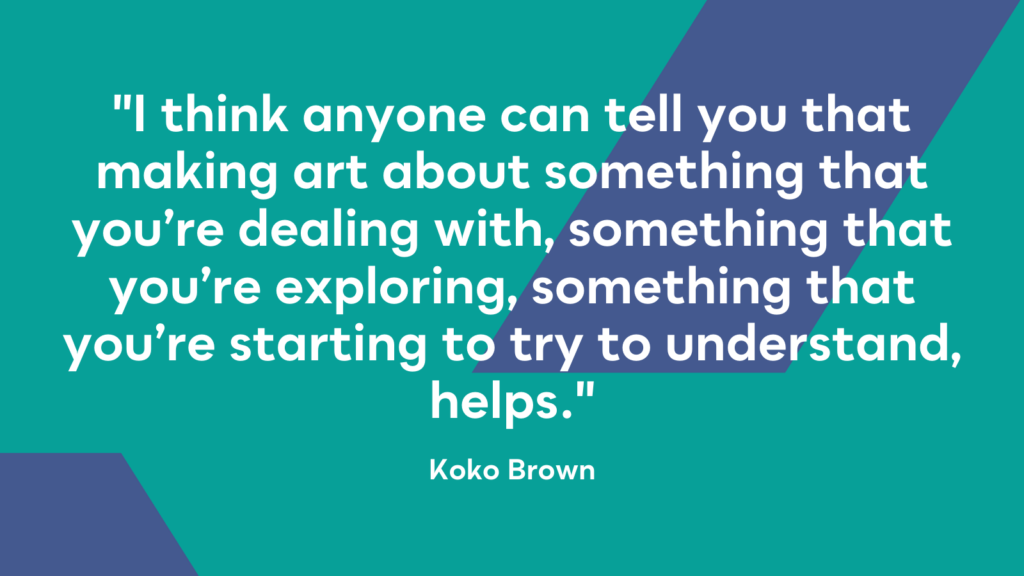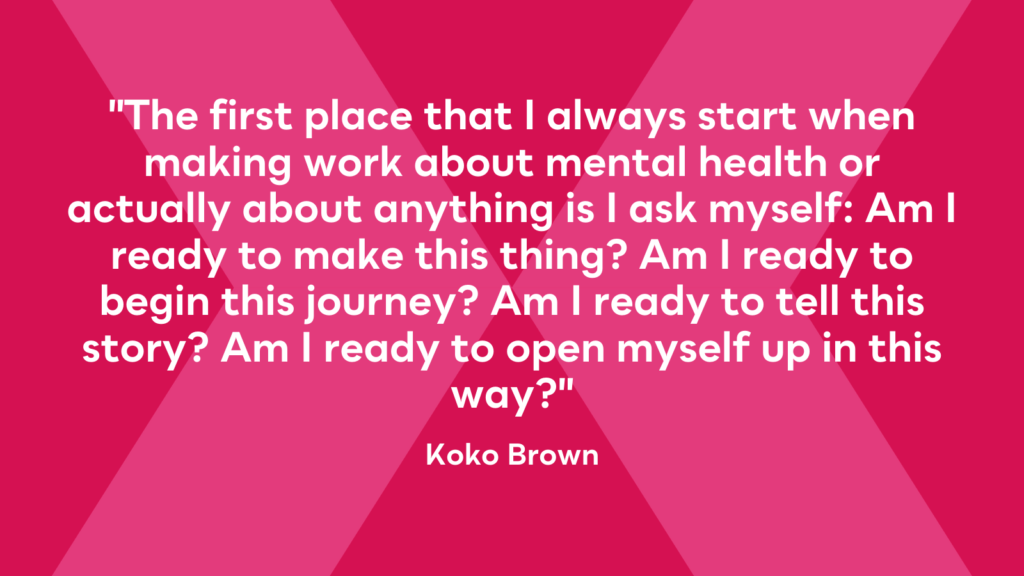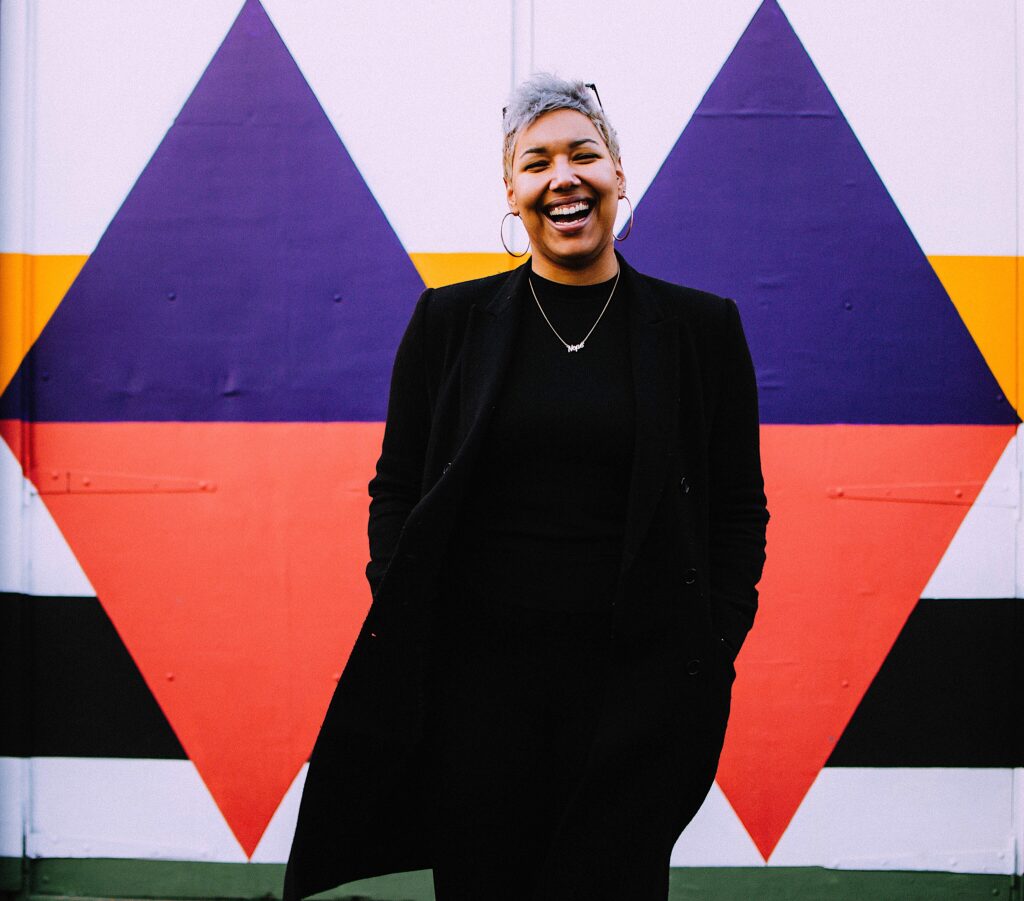For Mental Health Awareness Week, we invited Ovalhouse alumni Associate Artist Koko Brown to share her thoughts on the benefits of creating work about mental health and to give some practical advice for theatremakers.
To download the full transcript please click the button below. Video description at bottom of page.
What work have you made about mental health?
I write a lot of poetry about mental health, a lot of spoken word pieces, because it’s something that I know, it’s something that I have grown up with, and that has been in my life in one way or another for a very, very long time. So it’s part of my identity, it’s part of my history, and it’s important to me to talk about these things because I can and I’m able to do that.
I also made a show called GREY. GREY is a theatre show about being a Black woman who lives with clinical depression, so it sort of follows my journey as a person who didn’t really understand what was happening, didn’t really understand the chemical mix up in her brain. Then going to talk to doctors and trying other forms of self-care, and looking at counselling and therapy and medication, and it sort of leads up to where I am in my life now.
That piece of work is really special to me because it was a chance for me to be able to talk to the world about clinical depression, and about being a Black woman living with mental illness, and how that affected me. So that’s the work that I make.
GREY
“She is a strong, independent, black woman. She has a roof over her head. She has food in her fridge. She lives a good life. She’s also a little bit sad, a lot of the time. She doesn’t understand why.”
Koko’s multidisciplinary show about Black women’s mental health premiered at Ovalhouse in July 2019. Blending spoken word, BSL and live looping, the play was a colourful and candid exploration of her experience with depression. “Depression is not poetic” but the language and imagery in GREY is compelling and lyrical. The playtext is available online and you can watch the trailer here. Did you see GREY at Ovalhouse or during our House to House season last summer? Share your experience with #GREYplay. We loved this review from A Younger Theatre.
Why is it important to make theatre about mental health?
Art is a form of release, I think. Anybody out there who does anything creative or artistic, whether as their job, or as a hobby, or as something they do as a side hustle, I think anyone can tell you that making art about something that you’re dealing with, something that you’re exploring, something that you’re starting to try to understand, helps. It’s helpful, it’s helpful to make work about this stuff, it’s helpful to make art and theatre about mental health for yourself. I think first you should do all things for yourself.
Helping positively affect others is another reason why I think it’s so important to make work about mental health. Because hopefully, you might say something that resonates with somebody else, or something that someone didn’t know, and they’ve learnt something, or they’ve seen the world in a different way, or they’re beginning to have an understanding of what it’s like to be in someone else’s shoes.

Where do you start with making work about mental health?
Well, this is really easy. The first place that I always start when making work about mental health or actually about anything is I ask myself, ‘Am I ready to make this thing? Am I ready to begin this journey? Am I ready to tell this story? Am I ready to open myself up in this way?’
That’s the most important thing, I think, is asking yourself, ‘Are you ready?’ and being honest. Sometimes you might ask yourself that question and actually the answer is no, the answer is, ‘I’m not ready to talk about this thing or to explore this, or to share it with the world,’ and that’s okay. Just be honest with yourself.
If the answer is ‘Yes, I am ready to do this,’ I think it’s really important to have an understanding that that might change as well. That might change along this journey, along you writing or creating this piece of art. You might begin thinking that you’re fine with it, and then you get somewhere and something changes, or it becomes a little bit difficult. Or you get a little bit triggered by something that’s been brought up and you have to be able to look after yourself, and you have to be able to be honest with yourself that actually maybe this isn’t the right time.
Then I question:
• What do I want to say?
What is it that is important to you, what is it that you want to give a platform to?
• Why am I making this work?
Similar to the first question about are you making it for yourself, are you making it because you want to just get some emotions and feelings and thoughts out? Are you making it because you want to help educate people on this subject, or topic, or feeling? Are you making it because you want to give platforms to people, communities, or specific sectors, for example?
• Who do I trust to make it with me?
Again, another really important one for me is thinking about when I’m making work about mental health, I don’t know how I’m going to be affected throughout this process, so I need to make sure that I’m working with people who are people that I trust, people that I can talk to, who can communicate well and can communicate with me. Whether that’s something we’ve got to learn together or something that we’ve already got from past experiences, either way, communication is super important.
I also think about whether the people I want to work with are good artists and for me when I was making GREY I was lucky enough to find people who I did trust, who had an understanding and who were also amazing artists in their own right. So I feel very fortunate for that.

How can you look after yourself and your team when making work about mental health?
It’s really important to be able to communicate with the people you’re working with and for them to be able to communicate with you and to understand how you all want to be communicated with. Are there moments where you might not want to talk about very difficult subjects or topics, but you’ve allocated space for that so that people know what they’re walking into.
Especially when you’re making work about mental health, you don’t know what is happening outside of your rehearsal room or outside of your studio, so you need to make sure that the space is as safe as possible for you all to do the good work you’re gonna do.
So that’s about communicating, that’s about setting boundaries and guidelines of ‘These are the things that we’re gonna talk about. If you feel unsafe or upset or worried, these are the things that you can do, these are the people that you can go to.’
Things such as taking regular breaks and saying, ‘We’ll have a break whenever we do this scene because it’s what’s best for the creative team and the company.’ Communication is my biggest one.
I also think that it’s worth thinking about how you’re going to keep yourself safe, when making work about mental health. Whether that’s talking to a therapist and having a regular, scheduled therapy session, or whether that is talking to friends, whether that is having helpline numbers in case something really does affect you and you need immediate help.
All of these things are, I would say, practical self-care. Something that’s really important to me is finding ways of practically incorporating self-care within your work. Do you need helplines, do you need breaks, do you need specific space and time or people to be in the room when you make stuff? Those are ways that I look after my team and myself when I’m making work.
VIDEO DESCRIPTION:
Koko Brown is a mixed-Black woman with medium brown skin, dark brown eyes and short cropped black hair. She is wearing a close-fitting ribbed black top with short sleeves and is framed from chest up. Koko has some subtle make up on and smiles widely and often. She frequently gestures with her hands, her nails are long and carefully manicured with deep turquoise nail varnish.
The sun is shining on her from a nearby window and the light changes occasionally as clouds pass. She is sat in a white room with a handmade protest sign visible in the mirror hanging on the wall behind her. It says: BLACK TRANS QUEER DISBALED LIVES MATTER.
There are pink end cards on the video showing the Brixton House logo, Koko’s name and the video title and ‘Mental Health Awareness Week 2021’.

Koko Brown
Koko Brown is a Black-mixed, Queer, Disabled Artist & Producer. She takes pride in her roots, being ‘the other’ and blends theatre, spoken word and music throughout her work. She aims to make all her work #AccessibleAsStandard.
An alumni Associate Artist at Ovalhouse, Resident Artist at the Roundhouse and Oberon Books/Bloomsbury published author, Koko has worked with the National Theatre, Latitude Festival, Soho Theatre, Brainchild ,and Glastonbury Festival as well as international performance collective Hot Brown Honey.
Follow her @theKokoBrown or visit heykoko.com.
Photo by Malaika Dale.
Further Resources
If you’re looking for further resources or support, please click through to visit the following:
